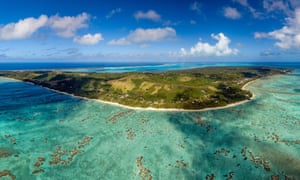- Blue acceleration is negatively impacting the ocean floor and is likely to cause harm to organisms.
- International Union for the Conservation of Nature has added the scaly-foot snail to its list of threatened species.
- The movement has increased ocean acidification, marine heating, coral reef destruction, and plastic pollution.
According to an article published in The Guardian, new research warns that ‘blue acceleration’ – a global goldrush to claim the ocean floor – is already impacting on the environment.

Research on life below sea
The scaly-foot snail is one of Earth’s strangest creatures. It lives more than 2,300 metres below the surface of the sea on a trio of deep-sea hydrothermal vents at the bottom of the Indian Ocean. Here it has evolved a remarkable form of protection against the crushing, grim conditions found at these Stygian depths. It grows a shell made of iron.
Discovered in 1999, the multi-layered iron sulphide armour of Chrysomallon squamiferum –which measures a few centimetres in diameter – has already attracted the interest of the US defence department, whose scientists are now studying its genes in a bid to discover how it grows its own metal armour.
Exploration of sea-bed leads to destruction
The researchers will have to move quickly, however, for the International Union for the Conservation of Nature has just added the snail to its list of threatened species. German and Chinese industrial groups have revealed plans to explore the seabed around two of the three vents that provide homes for scaly-foot snails. Should they proceed, and mine the seabed’s veins of metals and minerals, a large chunk of the snail’s home base will be destroyed and the existence of this remarkable little creature will be threatened.
“On land, we are already exploiting mineral resources to the full,” says Jean-Baptiste Jouffray, of Stockholm University. “At the same time, the need for rare elements and metals is becoming increasingly important to supply green technologies such as wind and solar power plants. And so industrialists are looking to the seabed where it is now technologically and economically feasible to mine for minerals. Hence the arrival of threats to creatures like the scaly-foot snail.”
Impact of future exploitation of the oceans
Jouffray is the lead author of an analysis, published last week in the journal One Earth, which involved synthesising 50 years of data from shipping, drilling, aquaculture, and other marine industries and which paints an alarming picture of the impact of future exploitation of the oceans.
This threat comes not just from seabed mining – which is set to expand dramatically in coming years – but from fish farming, desalination plant construction, shipping, submarine cable laying, cruise tourism and the building of offshore wind farms.
What is blue acceleration?
This is “blue acceleration”, the term that is used by Jouffray and his co-authors to describe the recent rapid rise in marine industrialisation, a trend that has brought increasing ocean acidification, marine heating, coral reef destruction, and plastic pollution in its wake. As they state in their paper: “From the shoreline to the deep sea, the blue acceleration is already having major social and ecological consequences”.
Another illustration of blue acceleration is provided by seabed grabbing, state the authors. Article 76 of the UN convention on the law of the sea (UNCLOS) allows countries to claim seabed that lies beyond the 200 miles of a nation’s exclusive economic zone. Since the first claim under Article 76 was made in 2001, 83 countries have made submissions. Put together, these claims account for more than 37 million sq km of seabed, an area more than twice the size of Russia.
Claiming the sea bed
Many seabed grabbers include small island states that are trying to become large ocean states in the process. For example, the Cook islands in the South Pacific has claimed an area of seabed that is 1,700 times its land surface. “The extension of the continental shelf is therefore not only transforming the geopoltical landscape, it is also substantially shrinking the area designated as the common heritage of humankind,” states the report.

Chrysomallon squamiferum – the scaly-foot snail. Photograph: Chong Chen
Examples of the conflicts that could ensue because of the blue acceleration include the disruption of key fish stocks by drilling for gas or oil offshore; pipelines that prevent trawl fishing; and offshore wind farms that disturb tourism.
Norway provides a stark demonstration of likely future conflicts. It aims to bring about fivefold rises both in salmon farming and cruise tourism in its waters over coming years while also building more and more offshore wind farms and more and more offshore gas and oil platforms. Seabed mining for minerals is also scheduled to begin. This saturation of ocean space renders Norwegian waters as being highly vulnerable to shocks, states the report.
South China Sea
The South China Sea is another potential flash point. It is a key gateway in the region’s network of undersea telecommunication cables; a third of the world’s shipping passes through it; while half the world’s fishing boats operate in its waters – which are disputed variously by China, Malaysia, Vietnam and others. Should armed conflict break out here over any of these issues, there would be a far-reaching impact on the world’s economy.
“The relevance of the ocean for humanity’s future is undisputed,” states the report. “However, addressing the diversity of claims, their impacts and their interactions, will require effective governance.”
Need for accountability
To achieve this, the authors call for greater accountability to be imposed on those financing the fundamental changes that are now being made to Earth’s oceans. These include both banks and governments.
In addition, the vulnerability of small island states needs to be addressed, it adds: “Navigating the blue acceleration in a just and sustainable way requires particular emphasis on the implications of increased ocean use across the globe – and how these claims could have an impact on the economic safety and well-being of vulnerable communities and social groups.”
Did you subscribe to our daily newsletter?
It’s Free! Click here to Subscribe!
Source: TheGuardian
















